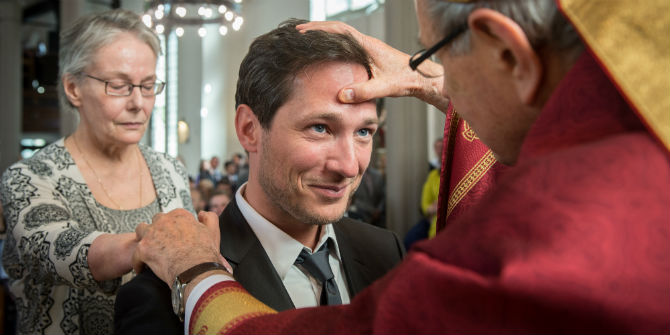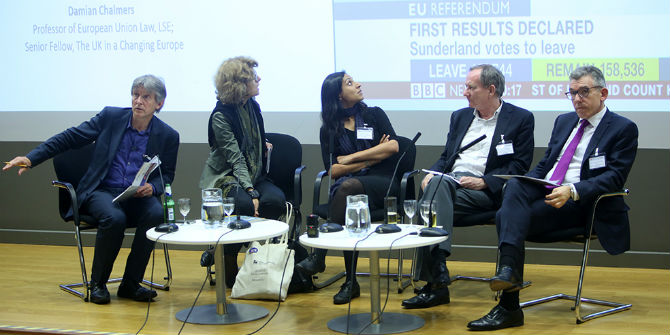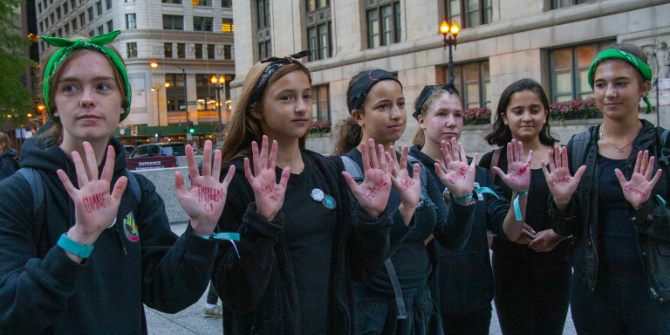 What can Britain learn from Christian thinking as it draws up a post-Brexit immigration policy? In his introduction to Fortress Britain, Ben Ryan (Theos) points out that migrants themselves are disproportionately Christian, as are the charities working in the field. Migration also informs a great deal of political theology.
What can Britain learn from Christian thinking as it draws up a post-Brexit immigration policy? In his introduction to Fortress Britain, Ben Ryan (Theos) points out that migrants themselves are disproportionately Christian, as are the charities working in the field. Migration also informs a great deal of political theology.
The UK will, at some point in the relatively near future, cease to be part of the EU. It will then have the opportunity to start from scratch, to consider its migration policy and decide just what it wants to embody. This opportunity provides space for critical reflection. Before enacting a new migration policy, now is the time to ask: what will be the values that will inform what we, as a nation, choose to do next? What ethical values make the best basis for making a coherent and consistent approach to migration?
There are good reasons for taking a particularly Christian approach seriously on these issues. For one thing, Christianity provides a language in which the British and the migrant communities can converse. For the former, although fewer than ever before now self-identify as Christian (the most recent British Social Attitudes survey found that 53 per cent of British adults now have no religion and only 41 per cent are Christian), the UK remains a place shaped and defined by its Christian history and values.

In an institutional sense this can be linked to the established Church of England, with its constitutional status that guarantees a level of political and public presence. However, more significant is a cultural sense in which, even without high levels of belief, the UK is still defined by a Christian intellectual values structure in some way. Jean-Paul Sartre was discussing the Europe of the 1970s when he declared that,
“… we are all still Christians today; the most radical unbelief is Christian atheism, an atheism that despite its destructive power preserves guiding schemes – very few for thought, more for the imagination, most for the sensibility, whose source lies in the centuries of Christianity to which we are heirs, like it or not.” (L’idiot de la famille, 1971)
Less polemically, we might describe the UK of today as being in a state of ‘belonging but not believing’, to flip the famous formula of the British sociologist Grace Davie. In this sense the UK has become a space which culturally identifies with Christianity, and is informed by it, even if increasingly few people attend church or believe in God.
As for migrants, they are significantly more likely to be religious (and Christian) than the British. Migrants into the UK are more than three times more likely than natives to attend a religious service weekly, or to pray daily. The 2011 Census revealed that just under 50 per cent of the non-UK-born population self-identified as Christian, 19 per cent as Muslim, while only 15 per cent had no religion. In searching for a shared register, therefore, religion in general (and Christianity in particular) has much to recommend it. For both the British indigenous population and migrant communities, an ethical model from within Christianity connects well with their own identities. For those fearing that their identity could be fatally undermined by migration (either because they feel they are being replaced, or that assimilation will compromise their own beliefs and traditions) having a value structure that speaks in a religious language would be a valuable asset.
A second reason to take Christian ethics seriously in this field is that Christians have earned the right to have a voice in a sector in which they play a major role. Particularly when it comes to work with refugees, Christian charities and interventions seem to take on a disproportionate scale of the work. Among the Christian operations in this space are the City of Sanctuary movement, community sponsorship schemes, the For Refugees group, the Boaz Trust and many others. Given the scale of activity being undertaken by Christian groups it seems appropriate to engage with their ethical reasoning.
Finally, Christianity and Judaism have much to offer on theories of migration, with a great deal of material on the experience of travelling and migration – to the extent that there is a case to be made that migration defines something of the human condition. Much of the Old Testament is explicitly concerned with the experience of the Jewish people and their patriarchs travelling from one place to another, or finding themselves in exile away from their home. The New Testament too finds Jesus and then his followers travelling and spreading the gospel ever wider across the Mediterranean world. The early experience of Christians was of a minority faith in a hostile environment, subverting many of the norms of the Roman world by denying that their religion was tied to a particular ethnic group.
Alongside this material on the experience of migration, Christian political theology has also developed a sophisticated conception of the nation, and what it means to be part of the nation (the Western model of nationhood, in fact, owes much to the Old Testament model of Israel). This too provides a useful lens through which to construct an ethical approach to migration, since the nation as a locus of identity is one of the key features in debates over citizenship and fears of cultural takeover.
Putting those together with the broader Christian theological traditions around the use of power and government, and the treatment of outsiders, and there are the makings of a fairly comprehensive body of thought on which to base a migration policy. For all these reasons, the authenticity of an approach which speaks to British cultural belonging and migrant faith, the scope of current Christian activity in this space and the depth of the intellectual reservoir that Christian theology can provide, Christian ethics are an excellent source on which to build a new, ethical approach to migration policy.
This is an edited extract from the introduction to Fortress Britain? Ethical Approaches to Immigration policy for a Post-Brexit Britain, edited by Ben Ryan, to be published on 18 April 2018. It represents the views of the author and not those of the Brexit blog, nor the LSE.
Ben Ryan is a researcher at Theos. He holds an MSc from the LSE’s European Institute.







Hasn’t April the first been and gone?